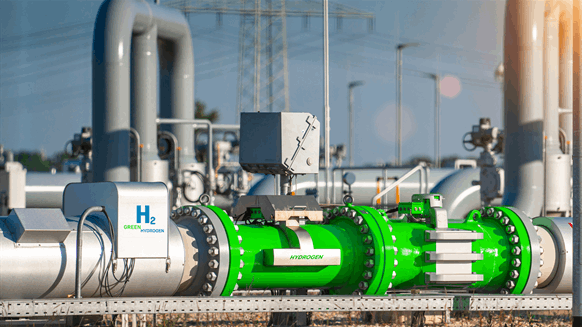Germany and Morocco are establishing a joint alliance on climate and energy issues.
The focus of the new partnership is on increased cooperation in climate adaptation, the expansion of renewable energies and the production of green hydrogen, according to a news release from the German Development Ministry (BMZ).
“With its geographical location on the windy Atlantic and its proximity to the desert, Morocco has excellent conditions for generating electricity from wind and solar power, which will enable it to meet the needs of its own economy and, in the long term, also start exporting green hydrogen to Germany,” the release stated.
The two nations have a prior collaboration in renewable energy, as the world’s largest solar thermal power plant was built in Ouarzazate in southern Morocco, with the help of the BMZ, according to the release. The plant supplies around 1.3 million people with electricity.
The BMZ said the next step for Morocco is the start of green hydrogen production, with the country having presented a hydrogen strategy two years ago. Solar power plants and wind farms enable the large-scale implementation and sustainable production of green hydrogen on an industrial scale and the development of green economic sectors, the agency noted.
Germany is involved in the construction of the first reference plant for the production of green hydrogen in Morocco, expected to be completed in the coming years. The plant will produce around 10,000 metric tons of hydrogen per year, which is enough to produce 50,000 metric tons of green steel. It is also intended to serve as a reference project for the profitability of green hydrogen production in Africa and to strengthen the confidence of private investors in Morocco as a location, the BMZ said.
“The new green hydrogen economy must be fair — different from what the fossil world economy ever was. That is why we are working on partnerships that benefit both sides,” German Federal Development Minister Svenja Schulze said.
“Morocco has the best conditions for the energy transition and the production of green hydrogen. Germany wants to import hydrogen. But we want to do this fairly and in partnership, namely in such a way that Morocco can also drive forward its energy transition and get its fair share of the value chains of the future. This new alliance is an encouraging sign of fair and respectful cooperation,” Schulze added.
“Morocco and Germany are regional pioneers in climate protection. Both countries are working on reducing coal-fired power and expanding renewable energies,” Parliamentary State Secretary to the Federal Minister for Economic Affairs and Climate Protection Stefan Wenzel said. “Morocco is therefore one of the first countries with which the Federal Ministry for Economic Affairs and Climate Protection has been implementing a very fruitful energy partnership for over ten years”.
“Morocco has enormous potential for renewable energies and green hydrogen. Because of the geographical proximity, we also support cooperation in electricity trading between Morocco and the EU [European Union]. We also want to advance the development of a hydrogen economy for the benefit of both parties and politically support the participation of German technology companies and suppliers. In addition, we want to work even more closely together in the field of skilled workers,” Wenzel said.

